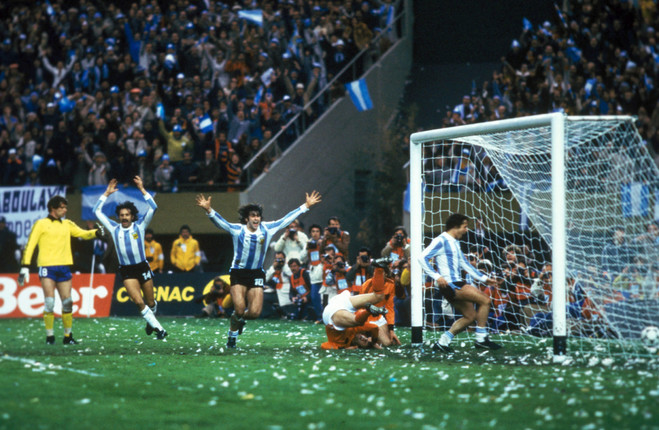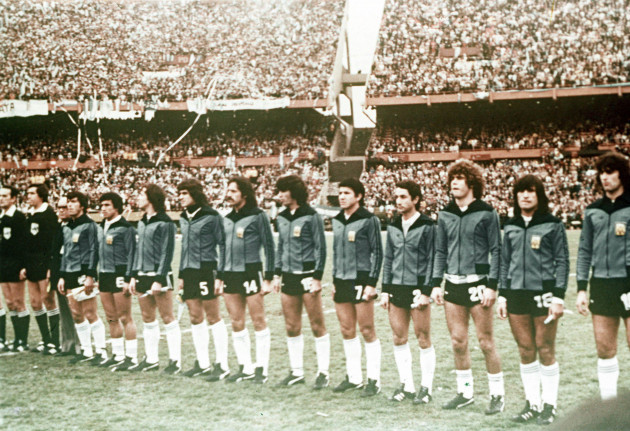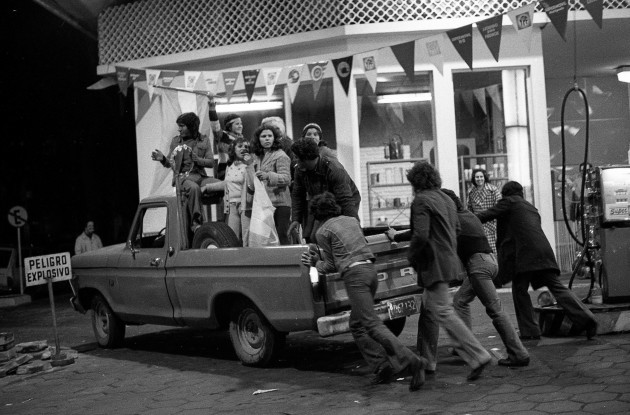POLITICS AND elite football are inextricably linked.
Every World Cup, therefore, has a political element to it.
However, a couple of tournaments, in particular, stand out, whereby politics has been in the foreground more so than in the background.
Italy hosted the 1934 World Cup just a few years before the country would play a central role in World War II. It was effectively ‘sportswashing’ before the term existed.
The propaganda was so widespread four years later that the Italian team infamously gave a pre-game fascist salute at the tournament in France, as the Azzurri claimed a second successive title.
12 years would pass before the next World Cup — the Brazil-hosted 1950 tournament — owing to the ensuing disruption caused by World War II.
In recent years, there have been examples too. Russia 2018 will not be looked back upon kindly by history given the events that followed it, while the same could be said for Qatar 2022 in light of the country’s well-documented human rights violations.
However, perhaps the most notorious example is Argentina-hosted World Cup in 1978.
The tournament took place amid the country’s Dirty War. Two years earlier, democratically elected president, Isabel Perón, was removed from power with General Jorge Rafael Videla installed in her place.
A turbulent period ensued amid the struggle for power. People with left-leaning tendencies perceived as threats were targeted.
It is estimated between 15,000-30,000 people disappeared, although unreliable records mean it is impossible to ascertain the exact figure. Sport was far from immune — almost every member of the left-wing La Plata Rugby Club, for instance, were never seen again.
However, one of the differences compared to Qatar now is that, with the non-existence of social media and tightly controlled national press, the extent of the brutality was not so widely known as the world’s top football teams descended on Argentina.
“Outside of Argentina, there wasn’t much knowledge of the extent of it,” explains Rhys Richards, author of ‘Blood on the Crossbar: The Dictatorship’s World Cup’.
“The only people who were able to offer knowledge were Argentinian exiles. So part of the boycott movement against the World Cup came from exiles who had left Argentina and had gone to Spain, France and the Netherlands. And they were crucial in really spreading that message of the atrocities that were taking place.”
There were consequently some protests. Bram Vermeulen and Freek De Jonge, two Dutch anarcho-comedians, were among those calling for the Netherlands to boycott the tournament, having become aware of the dire situation in Argentina.
There was also a strong campaign in France, with Le Monde newspaper among those urging a boycott.
By contrast, as is the case in Qatar now, Amnesty International advised against a boycott. Instead, they launched a “yes to football, no to torture” campaign, with the logic that the tournament would shine a light on the appalling conditions in the country and called for those attending to investigate what exactly was occurring.
“The dictatorship were particularly worried about the exiles, and how they really couldn’t control them,” explains Richards. “And they were losing a PR war on the image of Argentina, which is why staging and having a successful tournament was so important to them. They felt that if they could stage a successful tournament and revamp themselves, they could win this PR war and they could reinvent that image.
“Domestically, they really had to unite the country. And what better way than a successful football team that everyone could get behind?
“They really needed one thing to focus on to redefine Argentinian identity, which they were trying to reshape anyway, by purging the country of everyone who was against them.”
Fifa were nervous enough to consider a plan B, which involved Belgium and Netherlands co-hosting the tournament.
General Omar Actis, the original man tasked with organising the tournament, was brutally murdered, with the newspaper La Nación holding an “extremist group” responsible for the assassination.
Captain Carlos Alberto Lacoste succeeded Actis in the role and he had a close relationship with then-Fifa president João Havelange.
“Fifa and the dictatorship were one and the same so anything that the dictatorship wants — the scheduling of games, the appointment of referees, Fifa allows them to have,” explains Richards.
The Argentina team also benefitted from some questionable refereeing decisions over the course of the tournament and perhaps the most suspicious course of events occurred during their match with a Peru side that had previously impressed, topping a group that included Scotland and Netherlands.
Argentina needed to beat Peru by at least four goals to reach the final, at the expense of arch-rivals Brazil. They ended up winning 6-0, with the unlikely result prompting significant controversy.
Dictator Jorge Rafael Videla was rumoured to have paid a visit to the away team’s dressing room prior to the match, with speculation that they had agreed to allow the home side to advance, but foul play in this instance has never been proven.
“The Argentina team were very good as well so that helps,” adds Richards. “The Peru game where Argentina batter them 6-0 — that could have happened anyway because they had everything to play for and Peru didn’t.”
There are has also long been talk of Argentina players using performance-enhancing drugs, though again it has never been proven. Subsequent anecdotes emerged, including suggestions players were so high on amphetamines that they had to run for hours after games to feel normal again. There have also been stories of the team’s waterboy and his wife providing urine samples, with officials supposedly taken aback when one of the samples they received suggested a player was pregnant.
But while there remains a degree of ambiguity about what happened on the pitch, the dictatorship’s actions were unequivocally disgraceful and ruthless, with children among those affected.
“They feared for the future generation of left-leaning, or what they classed as subversives. So pregnant women were abducted, they had their babies taken away, and they were given to families of generals.
“There was a whole generation, thousands of Argentinian citizens [targeted]. Who knows what would have happened had they been allowed to lead the life that they were actually destined to?”
The tournament did at least quell the violence for a period, with enemies of the dictatorship agreeing to hold a temporary ceasefire.
“They didn’t want to be seen as the barbaric ones, or as terrorists,” says Richards. “In their eyes, they were freedom fighters. So they didn’t want to be blamed for that.
“Somebody who was there [that I spoke to] said it was the best time to be in that society ever. It was freedom. But it was freedom at a glance, because obviously under the surface, it was still a very precarious situation.”
The Argentine team ultimately prevailed 3-1 in the final against the Netherlands after extra time.
Yet the political violence loomed over the tournament figuratively and in a sense, literally.
The climactic match took place in Estadio Monumenta, River Plate’s stadium, which was located opposite ESMA, one of the main detention centres for political prisoners, to extent that they would have easily heard the cries from the nearby stadium as the game was taking place — a potent symbol for an utterly compromised tournament.
“It was hidden in plain sight,” adds Richards. “One really weird, perverse thing was that it was almost like a ceasefire during the game. So prisoners and prison guards were watching the game together and celebrated together. And then the next day, it was back to them being tortured.”
Consequently, looking back at the tournament from a modern-day perspective, the feelings of Argentine people are understandably mixed. While the 1978 win did bring some joy to the country, its association with the military junta tarnishes the victory irrevocably.
The ’78 champions’ counterparts who won the tournament in 1986 are accordingly remembered far more fondly given their less complicated legacy.
Richards, though, believes the association with the military junta is “unfair” to the players. Coach César Luis Menotti in particular projected a left-wing socialist image and seemed as far away as it was possible to be from the ideals of the dictatorship. He was tolerated ostensibly because of the team’s success on the field.
“Looking back, [the players] are horrified by it, and they really reject the association with it,” says Richards. “[Mario] Kempes said: ‘Look, we wore the blue and white of Argentina, we didn’t wear the green of the military.’
“At the time, they would have been less aware of what was happening, if not totally unaware.
“However, we look back with modern sensibilities, and we think this whole thing is horrific. But living there at the time, coups and military dictatorships weren’t irregular for the continent. They weren’t irregular for Argentina.
“So if you were a citizen there, you wouldn’t know everything that was going on. You also wouldn’t have known when the end was. So in terms of boycotting the team or refusing to play, I don’t think that ever would have been on the cards because people didn’t know what the future held for them.
“I think that was probably the case with Menotti. Even though he was the antithesis of everything they stood for, he still coached what was seen as a military team, and that was his only chance to coach Argentina. And I’m sure he felt he could show the best of the country by being the coach.”
The military, meanwhile, had constantly been anxious that hosting the tournament might backfire.
“They were always a presence there. Journalists would turn up and they would be watched like hawks. And they actually used the games as well to sniff out any potential agitators.
“So for example, they released people from prison, took them to the game, and then saw who would be attracted to them and who would they fraternise with. So they never really relinquished control and just enjoyed the tournament. There was always a worry that things could go wrong.”
The relentless nervousness was perhaps justified. By the time the next World Cup rolled around in 1982, the military dictatorship era was approaching its end.
The Falklands War debacle was ostensibly the final nail in the coffin amid a number of issues.
To quote Robert Morley, ARA Policy Planning Coordinator, 1979-1982: “It became evident to the Argentine public that the military not only couldn’t handle economics and politics and didn’t have a decent human rights record, it couldn’t even do what they were supposed to be experts at — that is, conduct an effective military campaign. So, they lost all credibility as a result of their adventurism.”
By 1983, Raúl Alfonsín had become the first Argentine politician democratically elected to office for more than seven years.
The World Cup may not have been the primary reason for the dictatorship’s unraveling, but there is a feeling that shining a light on the dreadful conditions and atmosphere of fear experienced by Argentine citizens, in addition to raising awareness of the atrocities, helped precipitate the military’s downfall.
Yet the 1978 tournament is simultaneously an archetypal example of football authorities shamefully working in tandem with a brutal regime intent on boosting their image, a situation that carries echoes of comparable tournaments both past and present. Yet perhaps it is the most egregious example of all, owing to the sheer scale of the tragedy and willingness of so many to turn a blind eye to the bloodshed.
“I think it is the most controversial, the most politicised [tournament] in a very politicised era — it’s in the midst of the Cold War,” concludes Richards. “I can’t think of anything that comes close to it in that respect.”
‘Blood on the Crossbar: The Dictatorship’s World Cup’ by Rhys Richards is published by Pitch Publishing. More details here.



